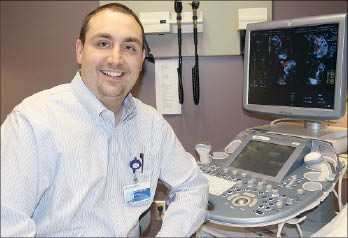
Home » Maternal-fetal specialist joins Sacred Heart center
Maternal-fetal specialist joins Sacred Heart center
Perinatologist sees patients with high-risk pregnancies, does OB-GYN consultation

October 20, 2011
Women facing high-risk pregnancies have few options here if they want to see a specialist in maternal-fetal medicine, known as a perinatologist, who's dedicated full time to a Spokane office.
One new choice is now available with the Sept. 1 hiring of Dr. Douglas Barber, who is a perinatologist at Providence Sacred Heart Medical Center & Children's Hospital.
Barber is part of a multispecialty team in Sacred Heart's Center for Maternal-Fetal Medicine, providing care for women with at-risk or high-risk pregnancies. He is on staff on a full-time, year-round basis. Deaconess Medical Center also says it has two perinatologists as full-time staff members.
Barber describes his first month here as "very busy."
"It's a need in the community," he says. "We have a constant stream of consults."
Examples of patients he works with include women expecting a complicated multiple birth, such as for triplets or quads. Other patients have pre-existing medical issues that can impact their health during pregnancy, including heart or kidney disease, hypertension, diabetes, and autoimmune disease.
Barber also may be called in because of pregnancy-related complications such as preterm labor or preeclampsia, a medical condition in which high blood pressure and protein in the urine occurs during pregnancy. In other instances, babies may be at risk during pregnancy because of chromosomal or congenital abnormalities, maternal disease, infection, or other complications.
Barber does some screening for healthy, normal pregnancies as well, which he says can provide women with first-trimester health information.
"I meet with some women contemplating pregnancy," he adds. "If a woman is in her 40s, for example, and has MS, I'd talk to her about what to expect. I do a lot of counseling and consultations."
He adds that the amount of time spent with a patient varies, depending on whether the woman's primary obstetrician-gynecologist is handling most of the care.
"I'd either work in conjunction with her regular OB-GYN, or if the OB-GYN refers the patient, then we accept patients for care," Barber says.
Maternal-fetal medicine specialists are obstetrician-gynecologists who undergo additional specialized training—usually three years—in the assessment and medical management of more difficult pregnancies. After four years at the University of Washington School of Medicine, Barber had four-year OB-GYN residency training at the University of California, Davis Medical Center, followed up by three years' training in perinatology, also at UC Davis.
On any given day, Barber spends time consulting with primary OB-GYN doctors, while also seeing patients who are referred directly to the center. He also works with a team to study two-dimensional and three-dimensional ultrasound images as part of exams that often can identify concerns as early as 10 weeks into a pregnancy.
Barber says prenatal diagnostic tools such as more sophisticated ultrasound equipment with Doppler technology have greatly increased the ability for early and often more accurate diagnosis of problems. Doppler essentially uses high-frequency sound waves to measure blood flows.
"It used to be diagnosis at 20 weeks, and now I can see a woman for screening at 10 weeks," he says. "I can make much earlier diagnosis, which gives them information much earlier in the pregnancy."
Other developments include more advanced genetic diagnostic screening for Down syndrome, and an integrated system of using ultrasound and blood samples to provide risk assessment to moms, he says.
For dealing with prenatal diagnosis, Barber also can consult with 128 pediatric specialists at Sacred Heart, he says. Additionally, as an example of the maternal-fetal medicine center's model, he says he can coordinate with a nurse practitioner to manage care for a patient with diabetes.
He acknowledges that it's an emotional time for the women he consults with daily who are facing difficult pregnancies.
"There are a lot of difficult concepts and data, and I'm sitting down with them and helping them with their pregnancies. Although it's not always good news, I spend a lot of time explaining."
He adds, "There's not a lot of studies about pregnant women, and it can be difficult to distill all the information. I come in and I spend a lot of time helping women understand the data so they can make the best, informed decision."
Latest News
Related Articles



